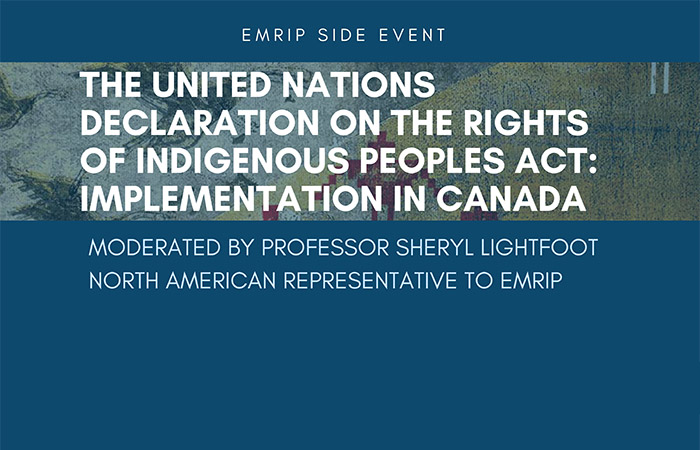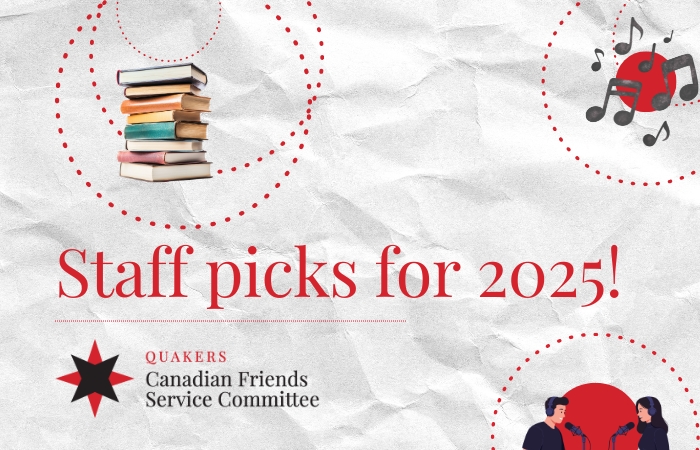
Your emotions are fundamental
May 2, 2022
Event video: Implementation of the UN Declaration on the Rights of Indigenous Peoples in Canada
July 6, 2022Earlier this month CFSC staff Nancy Russell joined other members of civil society in meeting with the United Nations Committee on the Rights of the Child. Nancy took the opportunity to highlight the issues identified in our submission below.
Questions that we drew to the attention of the Committee on the Rights of the Child have now been asked of Canada: How many children with incarcerated parents are living in Canada? How does Canada ensure the rights of these children? Good references were made to interrelated and vitally important issues including Truth and Reconciliation and Jordan’s Principle. https://www.ohchr.org/en/press-releases/2022/05/experts-committee-rights-child-commend-canada-truth-and-reconciliation
Supplemental Note to the Alternative Report of the Canadian Friends Service Committee (PDF).
To the members of the United Nations Committee on the Rights of the Child,
The attached alternative report “Regarding Children of Incarcerated Parents in Canada” was originally submitted by the Canadian Friends Service Committee (CFSC) on February 28, 2020. Friends in Canada remain deeply committed to holding ourselves and our government to account for the inequities faced by many children in our society.
Since 2020, Canada has faced troubling developments within its criminal justice system that include an increase in the proportion of incarcerated Indigenous women to almost 50% of all federally-sentenced women.[1] Most incarcerated women are mothers of dependent children. This is especially true for federally-sentenced Indigenous women.[2]
New governmental reports and legislation may help to provide context regarding efforts to “address the profound systemic inequities and disparities that remain present in the core fabric of our society, including our core institutions,” as was stated in Canada’s Ministry mandate letters in 2021.

We would like to draw your attention to the following:
– On June 16, 2021, the Standing Senate Committee on Human Rights released the Report on The Human Rights of Federally-Sentenced Persons. The report contains a 16 page section entitled Access to Family and Other Loved Ones. Highlights include statements about frequently cancelled visits, children of single parents with no extended family forced into the child welfare system, and limited means of communication as examples of barriers to maintaining fundamental and positive family ties.
– On June 21, 2021, the United Nations Declaration on the Rights of Indigenous Peoples Act received Royal Assent and immediately came into force. The Act respecting the United Nations Declaration on the Rights of Indigenous Peoples (UNDRIP) requires Canada to work in cooperation with Indigenous peoples to fully implement the UN Declaration. Article 22 of UNDRIP underscores that “particular attention shall be paid to the rights and special needs of elders, women, youth, children and persons with disabilities.”
– On June 29, 2021, the Reduction of Recidivism Framework Act received Royal Assent and came into force. The Act instructs the Minister of Public Safety to “consult with a variety of Indigenous governing bodies…and with…non-governmental, non-profit, faith-based and private sector organizations,” to develop and implement a federal framework to reduce recidivism. This prompted the National Associations Active in Criminal Justice to establish a working group of members interested in supporting and informing this new legislation. CFSC joined this working group and participated in two afternoons of round table consultations with Public Safety Canada in 2021. The working group has collaborated on a discussion paper which was released on April 6, 2022. The paper presumes that the “Social Determinants of Health are tantamount to the Social Determinants of Crime.” The paper includes strong statements about the needs of children with incarcerated parents in Canada.
It is the belief of CFSC that recidivism in its broadest sense requires the acknowledgement of intergenerational trauma and transmission of disadvantage and as such must incorporate community based sentencing as an alternative to incarceration. The Federal Framework to Reduce Recidivism is an opportunity for Canada to take a rights-based approach to improve conditions for children with incarcerated parents.
– On November 3, 2020 the Committee on the Rights of the Child (CRC) posted the “List of issues in relation to the combined Fifth and Sixth Reports of Canada.” The CRC requests Canada provide data disaggregated by age, sex, socioeconomic status, ethnic origin and geographic location regarding the situation of children deprived of a family environment, on the number of children in alternative care and/or foster/kinship care, and regarding the number of children separated from their parents. Access to fully disaggregated data can help to identify unknown trends, clarify the extent of issues, and assist governments to demonstrate that they have met their obligations as duty bearers.
We are unable to provide current numbers of children of incarcerated parents in Canada; Correctional Services Canada and Statistics Canada (national statistical office) still do not provide data regarding the number of interned persons that are also parents.
It seems strongly evident from the new legislation and available reports that policy makers, legislators, civil society organizations, rights holders and duty bearers across many communities in Canada recognize some of the problems and have envisioned achievable pathways to develop a more inclusive and child rights-based society. Whether or not these visions lead to concrete improvements remains to be seen.
We thank you for your consideration of this alternative report.
Sincerely,
Canadian Friends Service Committee (Quakers)
[1] Office of the Correctional Investigator, & Zinger, I. (2021, December 17). Proportion of Indigenous Women in Federal Custody Nears 50%: Correctional Investigator Issues Statement [Press release].
[2] Government of Canada: Standing Senate Committee on Human Rights, Ataullahjan, Chair, S., Thomas Bernard, Deputy Chair, W. E., & Hartling, Deputy Chair, N. J. (2021, June). Human Rights of Federally Sentenced Persons. Government of Canada.
Find out more about our concern for the wellbeing of children when their caregivers come into contact with the criminal justice system.




